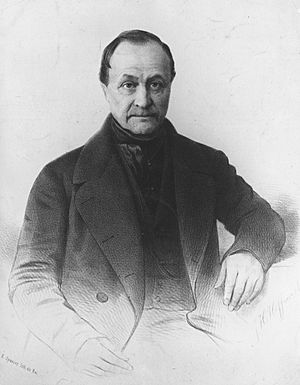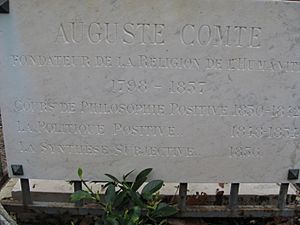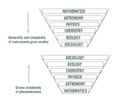Auguste Comte facts for kids
Quick facts for kids
Auguste Comte
|
|
|---|---|

Comte in 1849
|
|
| Born |
Isidore Marie Auguste François Xavier Comte
19 January 1798 |
| Died | 5 September 1857 (aged 59) |
| Education |
|
| Spouse(s) |
Caroline Massin
(m. 1825; div. 1842) |
| Era | 19th-century philosophy |
| Region | Western philosophy
|
| School | Positivism |
|
Notable ideas
|
Altruism Encyclopedic law Hierarchy of the sciences Law of three stages Positivist calendar Religion of Humanity Sociological positivism |
Auguste Comte (born Isidore Marie Auguste François Xavier Comte; 19 January 1798 – 5 September 1857) was a French thinker, mathematician, and writer. He created the idea of positivism, which is a way of thinking based on science and facts. Many people see him as the first philosopher of science in the modern world. Comte also helped create the study of sociology, which is the study of how societies work. He even invented the word "sociology" and thought it was the most important science.
Comte was inspired by Henri de Saint-Simon. He wanted to fix the problems in society after the French Revolution. He believed society was changing into something new. He tried to build a new way of understanding society based on science, which he called positivism. His ideas greatly influenced thinkers like John Stuart Mill and George Eliot in the 1800s. His ideas about Sociologie and how societies change over time influenced early social theorists like Harriet Martineau and Herbert Spencer. These ideas later became modern academic sociology. Comte's social ideas led to his "Religion of Humanity". He also might have created the word altruism, which means caring about others.
Contents
Who Was Auguste Comte?
Auguste Comte was born in Montpellier, France, on January 19, 1798. He studied at the University of Montpellier and then at École Polytechnique in Paris. This school was known for its ideas about republicanism and progress.
After leaving school, Comte moved to Paris. In 1817, he became a student and secretary for Henri de Saint-Simon. Saint-Simon introduced Comte to many important thinkers. Comte published his first essays in Saint-Simon's magazines. In 1824, Comte and Saint-Simon went their separate ways. Comte then published his own work, Plan of scientific studies necessary for the reorganization of society.
Comte married Caroline Massin in 1825. In 1826, he became very sick and went to a hospital. He later recovered and continued his work. Between 1826 and 1842, he published six books called Cours.
He became good friends with John Stuart Mill. In 1844, he fell in love with Clotilde de Vaux. After she died in 1846, his love for her became almost like a religion. Working with Mill, Comte developed a new "Religion of Humanity".
Comte published four more books, Système de politique positive, between 1851 and 1854. His last book, La Synthèse Subjective, came out in 1856. Auguste Comte died in Paris on September 5, 1857, from stomach cancer. He is buried in the Père Lachaise Cemetery. His old apartment in Paris is now a museum called the Maison d'Auguste Comte.
Comte's Main Ideas
Understanding Positivism
Comte first explained his idea of positivism in a series of books called The Course in Positive Philosophy (1830-1842). He later wrote A General View of Positivism in 1848. The first books focused on sciences like mathematics, astronomy, physics, chemistry, and biology. The later books talked about how social science would become very important.
Comte noticed that in science, ideas and observations always depend on each other. He also organized sciences in a specific way. Because of this, he is seen as the first philosopher of science in the modern sense. He was also the first to clearly separate natural philosophy from science. He believed that physical sciences had to come first. This would then allow people to focus on the most complex "Queen science" of human society itself. His book View of Positivism explained the goals of the sociological method in more detail.
Comte believed that society changes over time. He suggested that society goes through three main stages to find the truth. He called this the law of three stages.
The Law of Three Stages
Comte's law of three stages is a theory about how human thinking and societies develop. He said that all knowledge and every part of our understanding goes through three main phases:
- The Theological stage (or fictitious stage)
- The Metaphysical stage (or abstract stage)
- The Positive stage (or scientific stage)
Comte believed that society changes like the human mind changes. He thought that the history of society could be divided into these three stages.
The Theological Stage
The first stage is the theological stage. In this stage, people explain things by believing in supernatural or religious forces. For example, they might think that gods or spirits cause events. This stage was common before the 1300s. People believed blindly in what their ancestors taught them. They thought supernatural powers were behind everything.
Comte saw this as the necessary starting point for human intelligence. It helped people make sense of the world when they didn't have scientific explanations. He believed that this stage helped organize early societies by creating shared beliefs.
The theological stage has three smaller parts:
- Fetishism: People believe that spirits or gods live in objects like trees or rocks. They might worship these objects.
- Polytheism: People believe in many different gods. Each god might control a specific part of nature or life, like a god of the sea or a god of the sun.
- Monotheism: People believe in one all-powerful God who controls everything. This stage simplifies beliefs and helps people think more clearly. Comte thought this was the highest point of the theological stage.
The Metaphysical Stage
The second stage is the metaphysical stage. This stage is a step between the theological and positive stages. In this stage, people replace supernatural causes with abstract ideas or forces. For example, instead of a god causing rain, they might think of "nature" or "universal rights" as the cause.
Comte saw this as a necessary transition. He believed that the human mind couldn't jump directly from believing in gods to believing only in science. This stage helps people move from old ways of thinking to new, more scientific ways. It's less important than the other two stages, but it helps bridge the gap.
The Positive Stage
The third and final stage is the positive stage. This is when the mind stops looking for the ultimate causes of things. Instead, it focuses on discovering the laws that govern how things work, using reason and observation. This stage relies on science, logical thinking, and facts.
Comte believed that his time (the 1800s) was in the positive stage. He thought that sociology was the most important science in this stage. He called it the "final science" because it would bring together all other knowledge about human behavior.
In the positive stage, people use observation to gather knowledge. They realize that laws exist and that the world can be explained through science. Comte believed that this stage would solve social problems and bring progress. He also thought that knowledge from the past is still important. He famously said, "The dead govern the living," meaning that what people discovered before us shapes our world today.
Comte divided sociology into two main parts:
- Social statics: This studies how society stays together and keeps its structure.
- Social dynamics: This studies the causes of social change and how societies evolve.
He believed that by understanding these, we could build a strong and intellectual society.
The Religion of Humanity
In his later years, Comte developed the Religion of Humanity. This was a system for positivist societies to have a shared purpose, similar to how traditional religions work. He even suggested a new calendar called the 'positivist calendar'.
Some people, like John Stuart Mill, saw two sides of Comte: the "good Comte" who wrote about positivism, and the "bad Comte" who created this secular religion. The Religion of Humanity itself wasn't very successful. However, it influenced the creation of Secular Humanist groups in the 19th century. Comte's followers liked his idea of a "religion of humanity" and his motto "vivre pour autrui" ("live for others"), which is where the word "altruism" comes from.
Comte's Predictions
Auguste Comte once wrote in his book The Positive Philosophy that people would never be able to figure out what stars are made of. This turned out to be a wrong prediction. Within 30 years, scientists began to learn about the chemical makeup of stars using a method called spectroscopy.
Images for kids
-
The motto Ordem e Progresso ("Order and Progress") on the flag of Brazil is inspired by Auguste Comte's ideas of positivism.
-
A Positivist temple in Porto Alegre, Brazil.
See also
 In Spanish: Auguste Comte para niños
In Spanish: Auguste Comte para niños
 | Bayard Rustin |
 | Jeannette Carter |
 | Jeremiah A. Brown |





